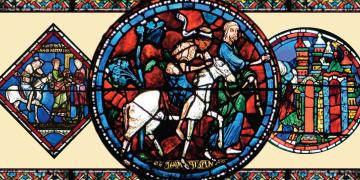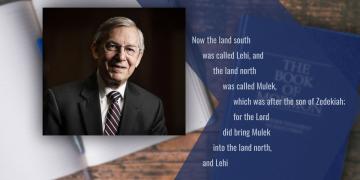You are here
Insights into the Life of Mormon from Moroni 9
Several scholars have looked carefully at Mormon’s letter in Moroni 9 and tried to determine when he wrote it. Pioneering Book of Mormon scholar Sidney B. Sperry dated it to between AD 380–384.1 More recently, two others, Alan Miner and Joseph Spencer, separately came to similar conclusions, placing this letter somewhere between AD 375–380.2 The details supporting this dating were summarized in KnoWhy 477, “When Did Mormon Write His Letter Recorded in Moroni 9?” Meanwhile, Robert F. Smith placed the letter around AD 366,3 and researcher Jerry Grover has argued for a much earlier date, ca. AD 345–350.4
In the John W. Welch Notes, recently published by Book of Mormon Central, one of the foremost scholars of the Book of Mormon weighs in on this question. Welch finds striking parallels between the events narrated in Mormon 4 and circumstances candidly described in Moroni 9.5 The table below aligns the text from both chapters for direct comparison.6 The events of Mormon 4 took place between AD 363–375, leading Welch to conclude that “Moroni 9 was likely written sometime around AD 375–376.”7 Welch reasons, “Mormon first wrote about these events in Mormon 4 and then drafted the personal letter to Moroni in Moroni 9 based on that record.”8
The purpose of this note is not to settle this question once and for all, but to assemble in one place references to these efforts to date Moroni 9. The majority view places the letter somewhere between AD 375–380, and it could well make sense for the letter to have been written shortly after AD 375.
Reading Mormon 4 and the first part of Mormon 5 side-by-side can new shed light on Mormon’s life and what influenced his teachings. For instance, earlier Mormon had “utterly refuse[d]” to lead the Nephites in battle, “from this time forth” due to “their wickedness and abomination” (Mormon 3:11, cf. vv. 10–16). After the events of Mormon 4, Mormon “did repent of the oath which I had made that I would no more assist them” (Mormon 5:1).
Mormon’s epistle to his son written at about this same time illuminates why Mormon changed his mind. To Moroni, Mormon exhorted, “notwithstanding their hardness, let us labor diligently; for if we should cease to labor, we should be brought under condemnation; for we have a labor to perform whilst in this tabernacle of clay, that we may conquer the enemy of all righteousness, and rest our souls in the kingdom of God” (Moroni 9:6). As Welch explains:
Mormon was talking about his spiritual decision to repent of his oath. He was essentially saying, “Well, we are still here. God has spared our lives. As long as we are alive, he expects us to be working. We must carry on with the responsibilities that he has given us.” Again, the history and the letter carry parallel information. Plainly, Mormon’s letter here is describing the same conditions and events as are reported in the historical records in Mormon 4 and 5.9
Several further insights into Mormon’s life like this can be found in Welch’s notes for this week, or by studying the table below and considering how these two texts amplify and clarify each other.
|
Mormon 4 |
Moroni 9 |
|---|---|
|
“the Lamanites did take possession of the city Desolation, and did slay many of the Nephites, and did take many prisoners. … And they did also march forward against the city Teancum, and did drive the inhabitants forth out of her, and did take many prisoners both women and children” (2, 14) |
“the Lamanites have many prisoners, which they took from the tower of Sherrizah; and there were men, women, and children.” (7) |
|
“the Nephites being angry because the Lamanites had sacrificed their women and their children, that they did go against the Lamanites with exceedingly great anger” (10) |
“I fear lest the Lamanites shall destroy this people; for they do not repent, and Satan stirreth them up continually to anger one with another. … and when I speak the word of God with sharpness they tremble and anger against me … For so exceedingly do they anger that it seemeth me that they have no fear of death; and they have lost their love, one towards another; and they thirst after blood and revenge continually” (3–5) |
|
“And it is impossible for the tongue to describe, or for man to write a perfect description of the horrible scene of the blood and carnage which was among the people, both of the Nephites and of the Lamanites; and every heart was hardened, so that they delighted in the shedding of blood continually. And there never had been so great wickedness among all the children of Lehi, nor even among all the house of Israel, according to the words of the Lord, as was among this people.” (11–12) |
“And the husbands and fathers of those women and children they have slain; and they feed the women upon the flesh of their husbands, and the children upon the flesh of their fathers; and no water, save a little, do they give unto them. And notwithstanding this great abomination of the Lamanites, it doth not exceed that of our people in Moriantum. For behold, many of the daughters of the Lamanites have they taken prisoners; and after depriving them of that which was most dear and precious above all things, which is chastity and virtue—And after they had done this thing, they did murder them in a most cruel manner, torturing their bodies even unto death; and after they have done this, they devour their flesh like unto wild beasts, because of the hardness of their hearts; and they do it for a token of bravery. … O the depravity of my people! They are without order and without mercy. … And they have become strong in their perversion; and they are alike brutal, sparing none … and the suffering of our women and our children upon all the face of this land doth exceed everything; yea, tongue cannot tell, neither can it be written.” (8–10, 18–19) |
|
And it came to pass that the Lamanites did take possession of the city Desolation, and this because their number did exceed the number of the Nephites. (13) |
“For behold, I have had a sore battle with the Lamanites, in which we did not conquer” (2) |
|
And from this time forth did the Nephites gain no power over the Lamanites, but began to be swept off by them even as a dew before the sun. (18) |
“And if it so be that they perish, we know that many of our brethren have deserted over unto the Lamanites, and many more will also desert over unto them” (24) |
|
“I did go to the hill Shim, and did take up all the records which Ammaron had hid up unto the Lord” (23) |
“I have sacred records that I would deliver up unto thee.” (24) |
|
“And it came to pass that I did go forth among the Nephites, and did repent of the oath which I had made that I would no more assist them” (5:1) |
“And now, my beloved son, notwithstanding their hardness, let us labor diligently; for if we should cease to labor, we should be brought under condemnation; for we have a labor to perform whilst in this tabernacle of clay, that we may conquer the enemy of all righteousness, and rest our souls in the kingdom of God” (6) |
- 1. Sidney B. Sperry, Book of Mormon Compendium (Salt Lake City, UT: Bookcraft, 1968), 491.
- 2. Alan C. Miner, “A Chronological Setting for the Epistles of Mormon to Moroni,” Journal of Book of Mormon Studies 3, no. 2 (1994): 94–113; Joseph M. Spencer, “On the Dating of Moroni 8–9,” Interpreter: A Journal of Mormon Scripture 22 (2016): 131–148. Miner more specifically dates the letter to 375–376 AD. In some unpublished notes, Brant A. Gardner has dated Moroni 9 to ca. AD 375.
- 3. Robert F. Smith, “Epistolary Form in the Book of Mormon,” FARMS Review 22, no. 2 (2010): 126. Smith’s article, while containing valuable information relevant to the dating issue, was mainly concerned about the ancient epistolary style of Mormon’s letter found in Moroni 9.
- 4. Jerry D. Grover Jr., The Swords of Shule: Jaredite Land Northward Chronology, Geography, and Culture in Mesoamerica (Provo, UT: Challex Scientific Publishing, 2018), 174–176; Jerry D. Grover Jr., “Refining the Chronology of the Epistle on Moroni 9,” November 5, 2020.
- 5. John W. Welch, John W. Welch Notes (Springville, UT: Book of Mormon Central, 2020), 1059–1060, 1185–1191.
- 6. See the similar table in Smith, “Epistolary Form in the Book of Mormon,” 131–132.
- 7. Welch, John W. Welch Notes, 1059.
- 8. Welch, John W. Welch Notes, 1060.
- 9. Welch, John W. Welch Notes, 1188–1189.
Subscribe
Get the latest updates on Book of Mormon topics and research for free








